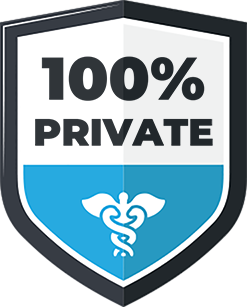Gonorrhea Testing
On This Page: Types of Tests | Who and When to Test | Treatment | Gonorrhea Symptoms | What is Gonorrhea
Gonorrhea Testing Information
Gonorrhea is a common bacterial STD. While it’s easily curable, it can cause infertility if left untreated. Getting regularly tested is the only way to know if you have gonorrhea. The thought of getting tested can be very stressful, but don’t worry. Testing is generally fast and painless, and gonorrhea is completely curable. Getting tested for gonorrhea lets you know if you have it, so you can get the medication needed to cure it.
Untreated gonorrhea can lead to infertility in both men and women and make you more susceptible to contracting additional STDs. Gonorrhea is an STD that is easily cured with antibiotics. Order quick and confidential testing today.
or call 1-800-456-2323 or start a Live Chat
Types of Gonorrhea Testing
Lab tests help doctors diagnose gonorrhea. Types of gonorrhea testing include:
- Urine testing– You pee into a cup, and the sample is taken to the lab for analysis to see if the bacterium Neisseria gonorrhoeae is present. This is the method we use for gonorrhea testing.
- Swab– Your urethra, vagina, cervix, throat, anus, or eye is swabbed to collect cells. This method may be considered for non-genital gonorrhea, like if you had unprotected oral sex or receptive anal sex.
- Blood– A small blood sample is taken from your arm to detect if antibodies specific to gonorrhea are present.
How Do You Test for Gonorrhea?
You can get tested for gonorrhea and other STDs at one of our local, CLIA-certified testing centers. Our FDA-cleared NAA (nucleic acid amplification) gonorrhea test is a urine test that can be taken as soon as 2-6 days after exposure. It can detect the presence of bacteria in the urine sample, regardless if symptoms are present.
When you arrive at the lab, you’ll be provided with a cup and a private bathroom. You’ll simply urinate into the cup, and then you can go on your way. Results are generally available within 1-2 business days and are posted to your online account.
Who Should Get Tested for Gonorrhea?
We recommend getting tested for gonorrhea if you:
- Have had sex with an infected partner
- Have had unprotected oral, vaginal, or anal sex
- Show gonorrhea symptoms (though gonorrhea doesn’t always show signs)
- Have had sex with new or multiple partners
- Want to verify your current health status
- Are pregnant
How Often Should You Get Tested for Gonorrhea?
If you believe you may have been exposed to gonorrhea, you should get tested. The Centers for Disease Control and Prevention (CDC) recommends at least yearly gonorrhea screening for:1
- Sexually active women under 25
- Men who have sex with men
- Women who have risk factors like new or multiple sex partners
The CDC also recommends prenatal screening for all pregnant women under 25 or pregnant women with certain risk factors. The CDC recommends rescreening during the third trimester for women with high risk.
Getting regularly tested for gonorrhea and other sexually transmitted diseases is important for monitoring and protecting your health. Untreated gonorrhea can lead to health issues like:
- Infertility
- Pelvic inflammatory disease (PID)
- Epididymitis
- Disseminated gonococcal infection
- Increased risk of getting other STDs, like HIV, if exposed
What Should You Do If You Test Positive?
We understand how scary testing positive can be. The good news is that gonorrhea is curable and, if caught early, you can avoid serious health complications. Make sure to talk to your sexual partner(s) about getting tested and treated too.
If you test positive for gonorrhea through STDcheck.com, we offer a doctor consultation by phone and can prescribe treatment. Our doctors are here to help you with information about gonorrhea and instructions for taking the medicine. They can address any questions you have and then call in the prescription to the pharmacy of your choice.
How Is Gonorrhea Treated?
Gonorrhea is easily curable with antibiotics. After a positive diagnosis for gonorrhea, appropriate and consistent treatment is necessary to kill off the gonorrhea bacteria. Antibiotics often used to cure gonorrhea include azithromycin, doxycycline, ceftriaxone or cefixime.
The CDC recommends dual therapy (i.e. using two antibiotics) for treating gonorrhea because the bacteria can sometimes become resistant to drugs. Speak to a doctor about what the best option is for you.2
Can You Get Re-Infected?
Yes, anytime you are exposed to the gonorrhea bacterium, you can contract it. Having gonorrhea once does not make you immune to getting it again. This is why we recommend using protection and getting tested regularly.
When Can You Have Sex Again?
Because re-infections are common, you should wait until you and your partner(s) have completed gonorrhea treatment before having sex again. Do not have sex with anybody during your treatment.
After one week of properly taking antibiotics, you should be cured and cleared of the disease, but your sexual partner(s) need to also complete treatment in order to avoid you passing the infection back and forth. Taking your gonorrhea treatment is only enough to cure your infection; there’s not enough medication to share and cure your partner’s infection too. Your partner needs their own prescription and medication.
We understand that waiting to have sex can be hard, but it gives your body time to clear the infection. While condoms can reduce the risk of getting gonorrhea, they are not 100% effective.3 If you do have sex during the recommended period of abstinence, talk to your prescribing physician. They may recommend re-treatment or follow-up tests, depending on the situation.
When you resume sexual activity, correctly and consistently using protection can help reduce your chances of getting gonorrhea again. Use dental dams and latex condoms each time you have oral, vaginal, or anal sex. Being mutually monogamous with someone who has tested negative or limiting your sexual partners also helps.
Treating Gonorrhea During Pregnancy
Pregnant women with gonorrhea can be treated using certain antibiotics. It’s important to treat gonorrhea during pregnancy due to the high risk it poses to the fetus. If a baby contracts gonorrhea while passing through the birth canal, the baby can suffer blindness, joint infection, or a life-threatening blood infection.4
Speak to your prescribing doctor about the treatment options available to you during pregnancy.
Should You Retest After Treatment?
If you have finished treatment and want to retest to make sure the treatment has worked, the CDC recommends waiting three months to get retested.5 However, at the very least, you should wait at least 14 days after completing your treatment.
- “Screening Recommendations and Considerations Referenced in Treatment Guidelines and Original Sources.” Centers for Disease Control and Prevention. https://www.cdc.gov/std/program/outbreakresources/HANtemplate-gono.htm
- “Gonorrhea Treatment and Care.” Centers for Disease Control and Prevention. https://www.cdc.gov/std/gonorrhea/treatment.htm
- “Gonorrhea: Care Instructions.” Government of Alberta. https://myhealth.alberta.ca/Health/aftercareinformation/pages/conditions.aspx?hwid=uh3128
- “Gonorrhea - CDC Fact Sheet (Detailed Version).” Centers for Disease Control and Prevention. https://www.cdc.gov/std/gonorrhea/stdfact-gonorrhea-detailed.htm
- “Sexually Transmitted Diseases Treatment Guidelines, 2015.” Centers for Disease Control and Prevention. https://www.cdc.gov/mmwr/preview/mmwrhtml/rr6403a1.htm
Medically Reviewed by Colleen Ryan, MD on February 1, 2023
Written by Taysha on January 16, 2020
Fast, Private & Affordable
Our panels are carefully designed by our physicians to provide you with complete peace
of mind.
What should I get tested for?
Find out what test is right for you using our personalized Test Recommender.




